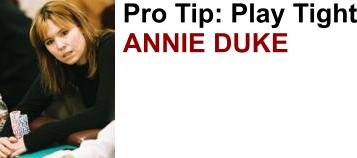Number One Tip for New Poker Players

 I’m often asked “what is the biggest tip I can give new poker players?” Easy. My number one tip is always to play tight. Rom my experience, most new players play about 80% of the hands they are dealt in Texas Hold’em. In fact, the reverse should be the case: they should only play about 20% of them!
I’m often asked “what is the biggest tip I can give new poker players?” Easy. My number one tip is always to play tight. Rom my experience, most new players play about 80% of the hands they are dealt in Texas Hold’em. In fact, the reverse should be the case: they should only play about 20% of them!
This probably isn’t earth-shattering news to anyone who has played a reasonable amount of poker. But it remains a deep concept that is worth deeply understanding.
The concept of playing tight actually only applies to the overall percentage of hands you play. When you are first to act or under the gun, you should play so tight that you only play around 5% of the hands you’re dealt; while in other positions, like the button or the big blind, you can drastically expand that percentage. It is only the average that should be around 20%. Up front, almost no hand should look good to you unless it is A-Q or better or at least 6-6 or better.
But why so tight?
There are many reasons to play super tight up front, but the one I want to focus on has to do with a decision making disadvantage.
 When we play poker, we never want to lose sight of the fact that it is a game of decision making. If you’re better at making those decisions than your opponents, you will win lots of money. The road to becoming the better decision maker is to bring to bear the maximum amount of information available to you. In poker this means using the information available to you to narrow down the holdings of your opponents. And therein lies the problem with playing loose up front. You will always be acting with the least info available because you do not know what your opponents are going to do after you. They, however, will always know what your action is when they get to act. They will have been able to watch you look at your cards. They will have been able to study your face, your body posture, the way you threw the chips in the pot when you acted. But you? You have none of that info.
When we play poker, we never want to lose sight of the fact that it is a game of decision making. If you’re better at making those decisions than your opponents, you will win lots of money. The road to becoming the better decision maker is to bring to bear the maximum amount of information available to you. In poker this means using the information available to you to narrow down the holdings of your opponents. And therein lies the problem with playing loose up front. You will always be acting with the least info available because you do not know what your opponents are going to do after you. They, however, will always know what your action is when they get to act. They will have been able to watch you look at your cards. They will have been able to study your face, your body posture, the way you threw the chips in the pot when you acted. But you? You have none of that info.
Poker is just like this: if you’re second to act, you can really loosen up. You can call raises with hands you would never raise with in the first position, because you know you will be acting second throughout the rest of the decision making process – acting with maximum information. You will be able to limp in with a much wider range of hands when people have limped in front of you, because the dangers of getting raised behind you are smaller when only the blinds are left to act. And when the action gets to the button and everyone has folded in front of you, you can raise with 70 to 80% of the hands you are dealt; because everyone knows you will act last for the rest of the hand.
The poor guy under the gun? Well, for him the opposite is always true. He can’t limp in because the danger of being raised is too high – he has no idea what the nine people left to act are going to do. For the rest of the hand, he knows he will have to act early in the decision making process. Having no idea of the quality of his nine opponent’s holdings, he has to be more choosy about the hands he raises with, since the chances of someone waking up with a much better hand are so high.
Being the first to act in poker is like being handcuffed to the decision making process. SO play tight up front!
![]() Check out the latest poker room reviews and ratings (what’s hot and not). Where does your site rate?
Check out the latest poker room reviews and ratings (what’s hot and not). Where does your site rate?
![]() Read more tips from professional poker players
Read more tips from professional poker players
No Comments so far
Leave a comment
Leave a comment
Line and paragraph breaks automatic, e-mail address never displayed, HTML allowed:
<a href="" title=""> <abbr title=""> <acronym title=""> <b> <blockquote cite=""> <cite> <code> <del datetime=""> <em> <i> <q cite=""> <s> <strike> <strong>